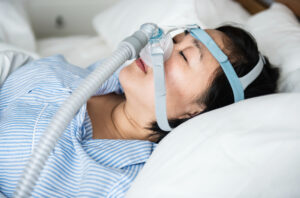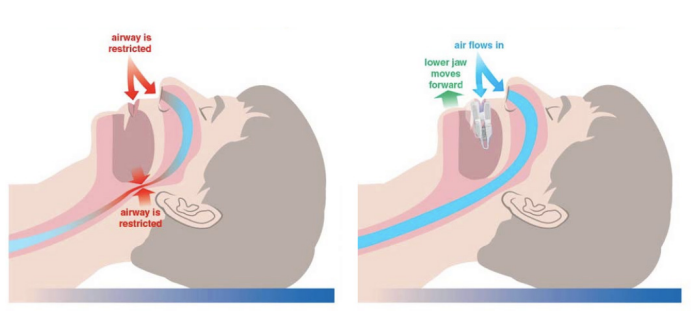What is Obstructive Sleep Apnoea?
 Obstructive sleep apnoea (OSA) affects how you breath while you are sleeping (breathing stops every now and then), sometimes leading to disruptive sleep (ie. lack of proper sleep). People who have sleep apnoea have an increased risk of heart problems, car accidents, work accidents and tend to take more sick days compared to people without OSA. OSA can happen in kids too and can affect their performance at school so be sure to check the sleeping patterns of your child!
Obstructive sleep apnoea (OSA) affects how you breath while you are sleeping (breathing stops every now and then), sometimes leading to disruptive sleep (ie. lack of proper sleep). People who have sleep apnoea have an increased risk of heart problems, car accidents, work accidents and tend to take more sick days compared to people without OSA. OSA can happen in kids too and can affect their performance at school so be sure to check the sleeping patterns of your child!
Why does Obstructive Sleep Apnoea happen?
Sleep Apnoea occurs when the muscles in the throat relax too much during sleep, leading to a narrowed or blocked airway. This obstruction stops your breathing, prompting the brain to wake you briefly to reopen the airway. These frequent disruptions prevent restful, deep sleep and can lead to chronic fatigue and other serious health issues over time.
Signs and Symptoms of Sleep Apnoea
There are several signs of OSA, most of which can be picked up by your dentist (if they have undergone sleep training). These include:
- The most common sign is consistent snoring.
- Grinding is also a sign of this and will present as flat, worn teeth in your mouth.
- Some patients also have acidic wear, which contributes to the worn teeth.
- Patients who can’t breathe through their nose when they sleep (and hence mouth-breath) have a high chance that they might have OSA. However, the most important sign of OSA is the lack of a proper sleep.
- Patients who do not sleep well tend to be tired during the day, are unable to pay attention for long and typically wake frequently to go to the toilet at night (this is the same as bed-wetting for kids).
- Sometimes symptoms can also manifest as headaches, pain in your shoulders, neck and jaw.
- Often many of our patients rely on caffeine or energy drinks to stay alert or easily fall asleep when watching TV.
- One of the most dangerous signs of Sleep Apnoea is falling asleep behind the wheel.
If you suspect you are not sleeping well and have been told that you snore &/or grind your teeth, we recommend that you speak to us about investigating potential OSA.
Effects of Sleep Apnoea
 Untreated sleep apnoea can have serious and wide-ranging effects on your health. Repeated interruptions in breathing and lack of restful sleep can lead to significant physical and mental health issues.
Untreated sleep apnoea can have serious and wide-ranging effects on your health. Repeated interruptions in breathing and lack of restful sleep can lead to significant physical and mental health issues.
Health Risks:
- High Blood Pressure: Around 45% of those with untreated sleep apnoea develop high blood pressure within four years.
- Heart Disease: The risk of heart attack doubles, and heart failure risk increases by 1.4 times.
- Stroke: Individuals with sleep apnoea have a 1.5 times higher risk of stroke.
- Diabetes: The condition can also contribute to the development of type 2 diabetes.
- Cognitive Impairment: Sleep apnoea can lead to memory loss, difficulty concentrating, and an increased risk of dementia.
Other Effects:
- Chronic Pain: Frequent headaches, neck and shoulder pain are common.
- Mental Health: There is a strong link between sleep apnoea and depression, anxiety, and irritability.
- Gastrointestinal Issues: Conditions like reflux (GORD) and irritable bowel syndrome (IBS) may worsen.
- Obesity: Sleep apnoea often contributes to weight gain, and obesity can further exacerbate the condition.
- Increased Mortality Risk: Severe untreated Sleep apnoea increases the risk of death within 10 years by one-third. Additionally, the likelihood of motor vehicle accidents rises 4-5 times due to drowsy driving.
Treatment Options for OSA
There are many ways to treat OSA. Lifestyle changes, dental treatments and in some cases, surgery, are options available to most patients. The treatment depends on the individual case.
Generally, the first investigation is a sleep study. This can be organised by your GP, ENT specialist or by us (Dental at Keys). The results of your sleep study will determine the severity of your sleep apnoea (if any) and hence the recommended treatment.
Common options for treatment of mild to moderate Sleep Apnoea include:
- Weight loss
- Smoking cessation
- Exercise
- Changing of body position when sleeping
- Dental oral appliance therapy (snoring mouth guard – mandibular advancement splint)
- Dental Orthodontics
Severe cases may require continuous positive airway pressure (CPAP) or even surgery. Surgery is typically indicated in patients who have airway obstruction, which can lead to OSA in some patients.
Mandibular Advancement Splints (MAS or Snoring Mouth Guard)
This involves wearing a specially designed device – a Mandibular Advancement Splint (MAS) – in your mouth (which is similar to a mouth guard) while you sleep at night. It works by primarily preventing the back of the throat and the tongue from collapsing onto your airway. By doing this, the appliance opens up the airway by pushing your lower jaw forward so you can breathe better at night.
Oral appliance therapy such as the mandibular advancement device (MAD) may result in an increase in saliva build-up, dry mouth, gum irritation or stiffness of the jaw muscles. These symptoms tend to settle with use. Long term use may change your bite and it is hence important to get the appliance checked regularly by your dentist.
*Please note: All OSA treatments are currently performed by Dr Daniella Lim.

Interested in Sleep Apnoea Treatment?
Contact us now on (03) 8899 6331 or check out our other services here.
Book Online*Please note: All Sleep consults are currently performed by Dr Daniella Lim – however, all of our dentist are able to do an initial screening to determine if you are required to see Dr Daniella Lim.
Need help with your dental payments?
We have a variety of Payment Plans available – giving you the flexibility of paying for your sleep apnoea treatment later.
Payment PlansFrequently Asked Questions
Can Sleep Apnoea kill you?
In a manner of speaking, yes, it can kill you slowly. This is due to the fact that it can increase the risk of life-threatening conditions such as heart disease, stroke, and high blood pressure if left untreated.
Can you cure OSA?
No, it is a life long condition and requires good management.
Is Sleep Apnoea genetic?
If close family members suffer from OSA, there is a higher likelihood of developing the condition. Other hereditary factors such as facial structure, neck circumference, and predisposition to certain conditions like obesity may also contribute to OSA.


